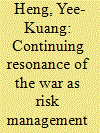| Srl | Item |
| 1 |
ID:
160735


|
|
|
|
|
| Summary/Abstract |
In the late 1990s and 2000s, a slew of books and journal articles proposed that a nexus between risk management and warfare was emerging. This article argues that risk management ideas continue to shape recent campaigns against Libya, Islamic State, Syria, and the war on terror from Niger, Yemen to Somalia. It uses existing literature on risk and warfare to examine four key aspects of contemporary interventions. First, the article evaluates the overall strategic context as security concerns shift from terrorism toward renewed great power competition. Second, it re-assesses the risk calculus for military action through the language and grammar of risk invoked by politicians. Third and fourth, it addresses the continuing reliance on air power and the managerial ethos of military operations as important features of war as risk management.
|
|
|
|
|
|
|
|
|
|
|
|
|
|
|
|
| 2 |
ID:
137628


|
|
|
|
|
| Summary/Abstract |
As captured by neorealist theory, military power became increasingly relative through into the twentieth century, leading to a concentration of power within and between states—and enabling the buildup of huge colonial empires hardly a century ago. Yet since 1945, due to the overproportional effectivity gained by weaker and in particular nonstate actors it has become less relative, leading to a dispersion of power—resulting in an often violent decolonization, the
problems US and North Atlantic Treaty Organization forces have faced in Iraq and Afghanistan in dealing with comparatively small insurgencies and a growing number of failing states. Military power has a selective function: the more relative it is, the more it restricts patterns of conflict as well as the number and nature of actors relevant to international and domestic security. Today, it is because military power is becoming less relative that security policy has to adapt to increasingly asymmetric challenges.
|
|
|
|
|
|
|
|
|
|
|
|
|
|
|
|